Are NFTs for authors over before they've barely begun? No, says Alliance of Independent Authors partner member James Faktor from Bookvolts, who is here to update us on the latest developments around NFTs for authors in 2023.
Introduction: NFTs and The Creator Economy
For a few years now, people have been talking of how NFTs have the potential to revolutionize how authors and other creators monetize and share their work, offering new opportunities for to grow businesses in the digital economy. Then, towards the end of last year, some claim that NFTs are dying.
Since January 2022 NFT market’s trading volumes have decreased 97%. Many readers and authors find blockchains inhospitable of not downright inaccessible. So should authors forget all about NFTs after all?
Below James Faktor says no but first a short introduction to NFTs by the AskALLi Team, including why NFTs and blockchains matter.
In the past, monetizing books required writers to work with third-party publishing houses, who would help distribute and sell their books. With Web2 and SelfPub2 came the rise of digital platforms. The rise of social media and other online platforms has given authors new ways to promote and share their work with a wider readership. Many have been able to build large followings and achieve significant success through their online presence.
Now with Web3 and SelfPub3, such authors are finding more direct ways to reach, engage with, and sell to their audiences.
This direct contact between writer and reader underlies the creator economy. It allows writers to monetize their work through a variety of channels, including subscriptions, sponsorships, merchandise as well as book sales, crowdfunding, patronage and other forms of direct payment.
Which is where NFTs come in.
As we explained in our original introductory post NFTs are best understood as 1) special content, some offshoot from your book, which is 2) traded as an asset, for cryptocurrency, 3) traded on a blockchain.
1. Special content — you can include any digital content (text, image, video, audio) on any aspect of your book (character, setting, bonus content, courses, research leftovers etc etc) in your NFT
2. Traded as an asset — an NFT is not a retail digital item, sold once and that's that. Governments and financial institutions treat it as an asset, which means it can be re-sold, and is subject to capital gains tax (or will be, when the finance world gets on top of things.)
3. Traded on a blockchain — NFTs use a blockchain, the decentralised ledger first used by bitcoin to track ownership of the cryptocurrency, to record who owns them and to allow them to be traded or modified.
“Think about an NFT as a collectible,” says ALLi's AI and enterprise advisor Joanna Penn. “Since we're authors and rights holders, think about the equivalent of a physical collectible like a limited edition hardback with a lovely leather cover with gold embossing, hand created by the author, for example. That would be a physical collectible. With NFTs, we're talking about digital collectibles.”
From a reader's point of view, NFTs have gained popularity in recent years because they allow proven, documented ownership of digital assets, including books and other forms of creative content.
From an author's point of view, NFTs and smart contracts allow earnings not just on the first sale. If a reader who bought your book decides to sell it on, you can receive a percentage profit on such secondary sales. NFTs are resistant to modifications, censorship, and alterations as NFT books cannot be changed without the author's consent, once that's agreed by smart contract.
At the Alliance of Independent Authors, we have encouraged interested authors who run a creator business model, post ]to explore the potential of NFTs as part of their offerings. You can read about some of those authors here.
Okay, now over to James.
NFTs in 2023
It’s been a tough few months for NFT’s. Having been named Collins Dictionary’s Word of the Year back in 2021, NFT’s (or ‘Non-fungible Tokens’, if you remember correctly from the hype period) have taken a steady nosedive in reputation and value, culminating in a crash landing with the collapse of FTX and the scandal surrounding the founder Sam Bankman-Fried in November 2022.
Is it game over for NFT’s?
Recent data suggests there may be signs of re-emergence for the unique digital token and blockchain in general. There were 9.2 million transactions in January of this year, up 37% from December and the highest sales count in six months. Trading volume in dollars also boomed, hitting $946 million, up 38% and the most since the $1 billion peak in June.
But is this a true renaissance for NFT’s or just another peak on the rollercoaster? And more importantly, what does this all mean for NFT books and the publishing industry? In this article I will look at the lay of the NFT land and three of the main players in the NFT publishing space: Book.io, BookVolts, and Soltype.io.
Let’s dive straight into the second question by highlighting the major success story for the book industry to date: the rise and rise of Book.io.
NFTs and the Publishing Industry
Book.io are a web3 publisher who have grown in reputation by releasing their own editions of classic public domain texts with eye-catching AI assisted cover designs. They have managed to build a large and dedicated audience through engaging continuously with their membership and offering “airdrops” and giveaways to their most loyal members.
The results certainly speak for themselves in terms of sales – on all of their total 66 book launches over the last 9 months, Book.io have managed to rake in a staggering $2.5million. It’s no wonder that publishers and authors have started to get involved with the project that initially started out as a collection of classic texts.
Author Case Studies: Joseph Nassise and Tom Leveen
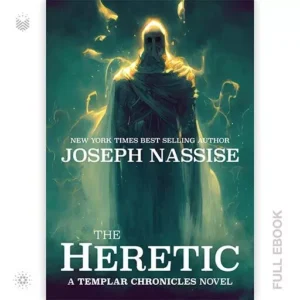 One of these early adopters of the platform is New York Times and USA Today bestselling author Joseph Nassise. His dark urban fantasy book ‘The Heretic’ was published by Harbinger Books back in 2017 on Kindle but was also his first foray into NFT publishing. Book.io decided to back the book as one of their debut fiction writers in October 2022 and built a long campaign around the launch highlighting various levels of rarity on each edition which created a lottery feeling for each buyer. The strategy worked. All 2,746 NFT copies of the book were sold out within an incredible 45 seconds, amassing nearly $50k in sales. It remains to be seen whether resales of the edition will bring in any further revenue, but as a republished edition this is already a remarkable achievement for the NFT publisher.
One of these early adopters of the platform is New York Times and USA Today bestselling author Joseph Nassise. His dark urban fantasy book ‘The Heretic’ was published by Harbinger Books back in 2017 on Kindle but was also his first foray into NFT publishing. Book.io decided to back the book as one of their debut fiction writers in October 2022 and built a long campaign around the launch highlighting various levels of rarity on each edition which created a lottery feeling for each buyer. The strategy worked. All 2,746 NFT copies of the book were sold out within an incredible 45 seconds, amassing nearly $50k in sales. It remains to be seen whether resales of the edition will bring in any further revenue, but as a republished edition this is already a remarkable achievement for the NFT publisher.
If you thought that such a feat was down to the 1.5k top reviews that Nassise had amassed for his book on Amazon, then consider the more recent success of ‘Sick’ by Tom Leveen. His gruesome zombie apocalypse survivor story was published back in 2014 by Amulet and resides outside the top 1 million on the Kindle bestseller chart with around 40 decent reviews. The book can only be selling a handful of copies a day currently, and yet Book.io managed to sell out his launch of 700 NFT editions in the space of 24 hours. At the current Cardano conversion rate, the company would have made $10k on sales, with the author taking his 30% share. Not bad for a day's work on a backlist title that was doing virtually nothing on Amazon.
 The potential for quick and easy payouts on a range of older titles has not escaped the attention of some of the bigger players in the publishing industry. Back in October 2022 Bertelsmann's venture capital firm BDMI made an investment in Book.io, signalling a clear ambition for Penguin Random House to get in on the action at some stage. Just prior to this investment, industry leading printer and distributor Ingram had also backed the NFT publisher, stating their intention to combine NFT launches with print on demand services in what was dubbed a ‘mint-and-print’ offering. Again, this is a signal that some of the biggest hitters in the publishing industry envisage NFT books being around for the long-term.
The potential for quick and easy payouts on a range of older titles has not escaped the attention of some of the bigger players in the publishing industry. Back in October 2022 Bertelsmann's venture capital firm BDMI made an investment in Book.io, signalling a clear ambition for Penguin Random House to get in on the action at some stage. Just prior to this investment, industry leading printer and distributor Ingram had also backed the NFT publisher, stating their intention to combine NFT launches with print on demand services in what was dubbed a ‘mint-and-print’ offering. Again, this is a signal that some of the biggest hitters in the publishing industry envisage NFT books being around for the long-term.
The Future of NFTs in the Publishing Industry
But the big question that the industry will be asking is ‘for how long can this trend on previously published books continue for?’ At the core of this question is another question: how many of the NFT buyers actually have an intention to read the book, and how many are just speculating on the value of the Cardano token and hoping to flip their NFT book in the future as an asset? How much is it a bit of both?
Aside from building a dedicated web3 community, what Book.io have done so well is align themselves with two key trends that are affecting the comeback of NFT’s: utility and affordability. With the growth of eco-friendly and cost-effective chains such as Polygon, the days of projects such as Bored Ape’s costing $250,000 and simply giving you membership to a lavish, elitist club seem to be on the wane. NFT buyers are starting to look for NFT’s that can actually offer them something tangible for a sensible price, and NFT books could be the fit right for this new milieu.
Like other major companies such as Nike, Instagram, Starbucks, and most recently Amazon (perhaps a signal of their ultimate intention in the blockchain publishing space), Book.io envisions NFT’s becoming a consumable product rather than an asset, a tool for customers to exercise true ownership over their digital possessions rather than as a ticket to a potential lottery win. Whether Book.io can transition away from this speculative Web3 collector base to a more traditional readership in the long run remains to be seen.
NFTs and BookVolts

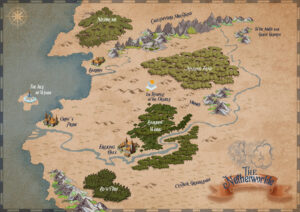 One company that is attempting to make NFTs more “readable” is BookVolts, a UK outfit with a strong focus on independent and self-published authors. Whereas Book.io have built success on repackaging existing ebooks with an AI-generated cover design, BookVolts are focusing on the reader experience, allowing NFT holders to read ebooks & access bonus multimedia content through their web and mobile apps.
One company that is attempting to make NFTs more “readable” is BookVolts, a UK outfit with a strong focus on independent and self-published authors. Whereas Book.io have built success on repackaging existing ebooks with an AI-generated cover design, BookVolts are focusing on the reader experience, allowing NFT holders to read ebooks & access bonus multimedia content through their web and mobile apps.
For example, in 2022, BookVolts relaunched James Fahy and his ‘Isle of Winds’ series with an NFT collection which gave owners of the NFT access to new maps, illustrations, an audiobook and an origins story which are unavailable anywhere else. In March 2023, BookVolts announced it was collaborating with Dacre Stoker, relative of Bram Stoker, to release an NFT edition of Dracula that contains a whole host of new material. The book will contain multimedia elements with video analysis from Dacre himself, along with images of rare manuscripts and notes from the Rosenbach Museum in Philadelphia, to create an immersive and genuinely unique edition of Dracula. The NFT edition will come with a restricted chat room so that only NFT holders will be able to access the lectures that Dacre decides to put on in the future.
The Power of NFTs for Books
This kind of innovation plays into the original vision of NFT books as being an additional weapon in the authors digital arsenal, something to run alongside Amazon ebooks rather than replace it. The best analogy is with hardcover books in the print world – NFT editions can be pre-released or published alongside all other formats, becoming the fan’s favourite that not only contains new and unseen written elements but also a closer connection to the author.
Both Book.io and BookVolts allow for their authors to place their books up on different platforms, making their NFT editions more of a contrast to subscription models such as Kindle Unlimited rather than ebook platforms in general. With minting and gas fees at an all time low on chains such as Polygon, there’s no reason why NFT books can’t be listed at a similar price to a standard ebook.
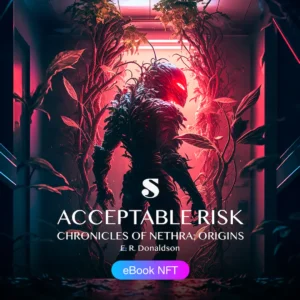
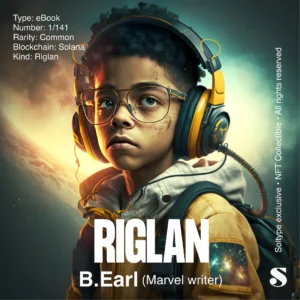 Soltype.io is another company that is starting to thrive again with the new crypto climate. They have a similar model to Book.io but are just behind in their community development, which as any publisher or independent author will know is a huge part of marketing. Soltype.io have recently released 3 ‘new’ titles from Sci-fi author E.R. Donaldson’s saga The Chronicles of Nethra series. Although the early editions are being given away for free right now, the launches have ‘sold out’ to the community and is a positive sign for future paid releases. They have Marvel writer B. Earl lined up for their next release with varying levels of rarity on each cover design, indicating a potential popularity for graphic novels and comic fans.
Soltype.io is another company that is starting to thrive again with the new crypto climate. They have a similar model to Book.io but are just behind in their community development, which as any publisher or independent author will know is a huge part of marketing. Soltype.io have recently released 3 ‘new’ titles from Sci-fi author E.R. Donaldson’s saga The Chronicles of Nethra series. Although the early editions are being given away for free right now, the launches have ‘sold out’ to the community and is a positive sign for future paid releases. They have Marvel writer B. Earl lined up for their next release with varying levels of rarity on each cover design, indicating a potential popularity for graphic novels and comic fans.
Soltype are looking to play more heavily on the collectability of their releases by randomly assigning a rarity to the NFT edition that gets dropped into the buyers wallet. They assign several layers of rarity from ‘Ordinary’ and ‘Common’ represented by 30-40% of the mint, right up to unique 1/1 editions, giving the drop a real buzz as to which edition a buyer will end up getting. The plan in selling so low or giving away for free is to create a lively secondary sales market on a major NFT platform like OpenSea or Magic Eden, although the long term success of this strategy has yet to be proven.
So what’s next for NFT books?
The category is still in its infancy but we can expect a lot of progress in 2023. Innovation in the publishing industry tends to lag behind other creative industries such as art and music, where there is a lot of excitement and progress being made with blockchain technology. If music is anything to go by, we can expect the major players to develop read2earn models, which rewards readers with tokens for interacting with work on the platform. This model is still in its infancy but it takes an interesting direction in focusing on rewarding the reader and reviewer for their contributions, something which traditional publishing has largely taken for granted.
Ultimately, the most successful players will have to attract web2 readers (readers who have not previously interacted with blockchain and who do not own a crypto wallet) onto their platforms. The blockchain is still quite an intimidating place for those who have not previously purchased crypto or NFTs, and work still needs to be done to make web3 more accessible to all.

James Faktor
That said, the fact that NFT books have already been proven to add value to digital publishing after more than a decade of author earning deflation and marketplace saturation means they should not be ignored.
With NFT’s beginning to turn a corner and with a clear roadmap for their utility, now is a perfect time for authors to start getting involved in NFT books to see for themselves how they could benefit from blockchain and NFTs.
James Faktor is the co-founder of BookVolts, bringing authors and fans closer together through blockchain publishing. Founder of USound, a simple solution for audiobook recording. Find out more on usound and bookvolts websites.

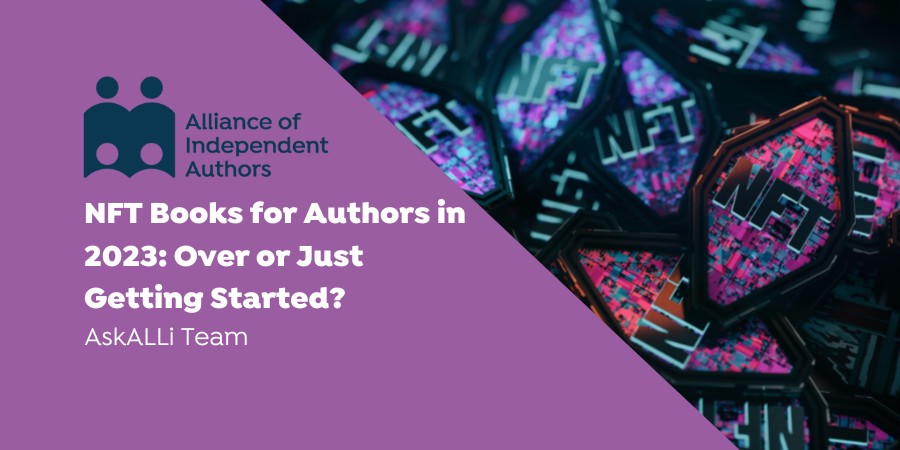



Where can I learn more abour bookvolt? Is there a whitepaper or link anywhere? What blockchain is it on? What fees? Will there be a marketplace built into app? So many questions?
#BenefitsofNFTDevelopment
Because NFTs guarantee the best security for works of art, like as paintings, songs, books, and so on, many people in the arts today desire to own non-fungible tokens. NFT utilization, however, is not just confined to the aforementioned uses because several people and businesses from different industries have already realized the worth of these tokens, which are as follows:
Guaranteed Authenticity
Guaranteed Ownership
Simple Transferability
New Economic Opportunity
Zero Intermediaries
Any digital asset’s NFT determines its uniqueness. In order to increase the utilization of these tokens, trade and own NFTs with high unique values. NFTs are rare, non-interchangeable, and serve as marketing tools in addition to having many other advantages for business expansion.
How do NFTs guarantee security? My understanding is that the book (or whatever) file is completely separate to the NFT. So how does an NFT add security?
Also, you say “Zero Intermediaries”, but as far as I can tell all NFT sales are conducted on platforms. The article mentions OpenSea and Magic Eden.
Anyone recommending NFTs at this date should really take a hard look in the mirror and reconsider what they’re doing with their lives. NFTa are a scam and to recommend them in any capacity is borderline criminal in 2023z